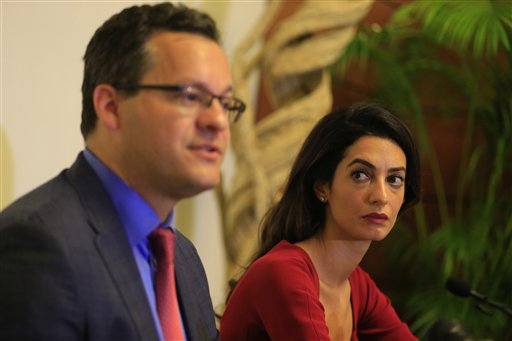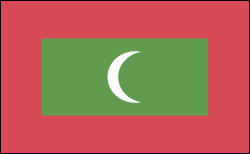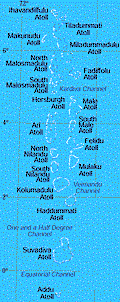Geography
The Republic of Maldives is a group of atolls in the Indian Ocean about 417 mi (671 km) southwest of Sri Lanka. Its 1,190 coral islets stretch over an area of 35,200 sq mi (90,000 sq km). With global warming and the shrinking of the polar ice caps, the Maldives is directly threatened, as none of its islands rises more than six feet above sea level.
Government
Republic.
History
The Maldives (formerly called the Maldive Islands) were first settled in the 5th century B.C. by Buddhist seafarers from India and Sri Lanka. According to tradition, Islam was adopted in 1153. Originally, the islands were under the suzerainty of Ceylon (now Sri Lanka). They came under British protection in 1887 and were a dependency of then-colony Ceylon until 1948. An independence agreement with Britain was signed July 26, 1965. For centuries a sultanate, the islands adopted a republican form of government in 1952, but the sultanate was restored in 1954. In 1968, however, as the result of a referendum, a republic was again established in the recently independent country. Ibrahim Nasir, the authoritarian president since 1968, was removed from office and replaced by the more progressive Maumoon Abdul Gayoom in 1978. Gayoom was elected to a sixth five-year term in 2003.
A Powerful Tsunami Strikes Maldives
On Dec. 26, 2004, a tremendously powerful tsunami in the Indian Ocean devastated 12 Asian countries. The Maldives reported 82 deaths and suffered enormous damage: 14 of the archipelago's islands became uninhabitable, requiring citizens to be permanently evacuated, and another 79 islands were left without safe drinking water.
A Shift to Multiparty Democracy
Parliament voted in June 2005 to shift to a multiparty democracy. In an Aug. 2007 referendum, voters supported President Gayoom's plan for a presidential system of government, similar to that of the United States. The opposition, which supports a parliamentary system, claimed the vote was rigged, and three members of Gayoom's cabinet resigned.
In the country's first multiparty elections, held in Oct. 2008, Mohamed Nasheed, a former political prisoner, defeated President Gayoom in the second round of voting, 54% to 46%. Gayoom had been in office for 30 years, ruling as an autocrat. Nasheed, an opposition leader who returned to the Maldives in 2005 from exile in England, had been a leader in the democratization movement. He vowed to crack down on corruption.
President Nasheed Resigns
In what he described as a coup, President Nasheed resigned from office on Feb. 7, 2012. Immediately following his resignation, a warrant was issued for his arrest for unspecified criminal charges. Mohammed Waheed Hassan was named president. On Feb. 11, an American envoy encouraged Hassan and Nasheed's two factions to form a unity government. America has an interest in Maldives because the country is located near crucial shipping lanes, which are infested with pirates.
Later in February, Hassan named his cabinet, which includes members of former President Gayoom's political party. However, the new government did not have the approval of Nasheed. On Feb. 16, spokesmen for both Nasheed and Hassan announced that the two sides had agreed on an early election. Voting would take place in a few months as opposed to the previously scheduled October 2013 election. However, no specific date had been set because the country's Constitution must be changed in order to move the election.
President Elections Are Held and Annulled in 2013
On September 7, 2013, presidential elections were held. Former President Mohamed Nasheed came in first with 45.5% of the vote. He was followed by Abdulla Yameen with 25.3%, then Qasim Ibrahim with 24.1% and incumbent Mohamed Waheed Hassan with 5.1%. A runoff was scheduled for September 28, 2013, but was postponed.
Exactly one month after the presidential elections, the Supreme Court annulled the election results and canceled the scheduled runoff. The Supreme Court made its decision after a candidate challenged the outcome of the election, pointing out irregularities.
New elections were held on November 9, 2013. This time Mohamed Nasheed received 46.9% of the vote, followed by Abdulla Yameen with 29.7% and Qasim Ibrahim with 23.3%. The Supreme Court delayed the runoff, which was to be held on November 10, until November 16. Meanwhile President Hassan's term ended on November 11.
Abdulla Yameen won the November 16 runoff with 51.4% of the vote. Former President Mohamed Nasheed was a close second with 48.6%. Yameen was sworn in the following day.
Former President Nasheed Is Arrested and Imprisoned
On Aug. 30, 2014, former President Mohamed Nasheed was elected head of the Maldivian Democratic Party (MDP), the largest political party in the country, and a party with democracy and human rights as its major goals. The following year, Nasheed was sentenced to 13 years in prison for having arrested Criminal Court Judge Abdulla Mohamed during his term as president. Nasheed was convicted under the Anti-Terrorism Act of Maldives. International organizations and the United States Department of State expressed concern over the lack of appropriate procedures during Nasheed's trial. Amnesty International called his conviction "politically motivated."
Nasheed has been fighting his conviction with an international legal team, including Amal Clooney, Jared Genser, Mahfooz Saeed, and Ben Emmerson. On Sept. 4, 2015, opposition MDP lawyer Saeed was attacked and stabbed by four masked men in Malé. Following the attack, MDP released a statement that said the premeditated attack was intended to be fatal.

Attorneys for Nasheed, Jared Genser and Amal Clooney,
addressing the media in Maldives, Sept. 2015
Source: AP Photo/ Hussain Sinan
See also Encyclopedia: Maldives
U.S. State Dept. Country Notes: Maldives
Ministry of Planning and National Development http://www.planning.gov.mv/en/ .











